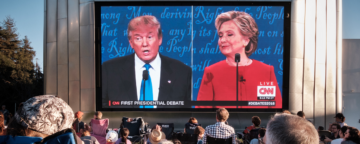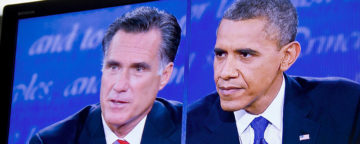Pope Francis’ 2015 encyclical on the environment, “Laudato Si’,” did not rally broad public support for climate change among Catholics and non-Catholics, according to a new study from researchers at the Annenberg Public Policy Center.


Pope Francis’ 2015 encyclical on the environment, “Laudato Si’,” did not rally broad public support for climate change among Catholics and non-Catholics, according to a new study from researchers at the Annenberg Public Policy Center.

A new Annenberg Public Policy Center study of the first 2016 presidential debate finds that what Hillary Clinton and Donald Trump they say about the issues – and don’t say – affects what viewers learn about their plans.

In a new white paper, "Presidential Debates: What's Behind the Numbers?" researchers from the Annenberg Public Policy Center take a close look at the data on the audience, ratings, and motivations of viewers of general-election presidential debates.

Only a quarter of Americans can name all three branches of government, the poorest showing on that question in a half-dozen years, a new survey on civic knowledge has found. The GOP presidential candidate was known to only 84 percent of the public.

Most Floridians favor the use of genetically modified mosquitoes to fight the spread of Zika virus and are significantly more likely to approve of it than people who live outside Florida, the Annenberg Science Knowledge survey has found.

Floridians see themselves at greater risk of being infected with Zika compared with other people nationally, and more Floridians than non-Florida residents have takening steps to protect themselves, an APPC survey finds.

Many Americans hold mistaken beliefs about Zika virus. To help provide the public with accurate information, the policy center has released a free "A Guide to Effective Zika Coverage" for writers, editors, reporters and broadcasters.

A new mandatory food-labeling law allows food producers to use digital codes to inform consumers that food contains genetically modified (GM) ingredients. But will consumers use smartphones or in-store readers to scan those QR codes?

Although most Americans are familiar with news reports about Zika virus, more than three-quarters of them say they haven’t done anything in the last three months to protect themselves from getting infected, a new APPC survey found.

There's widespread support for labeling genetically modified foods, as required in a new bill President Obama is expected to sign. But most Americans don't know that scientists have found no substantiated evidence to show that genetically modified foods are unsafe.